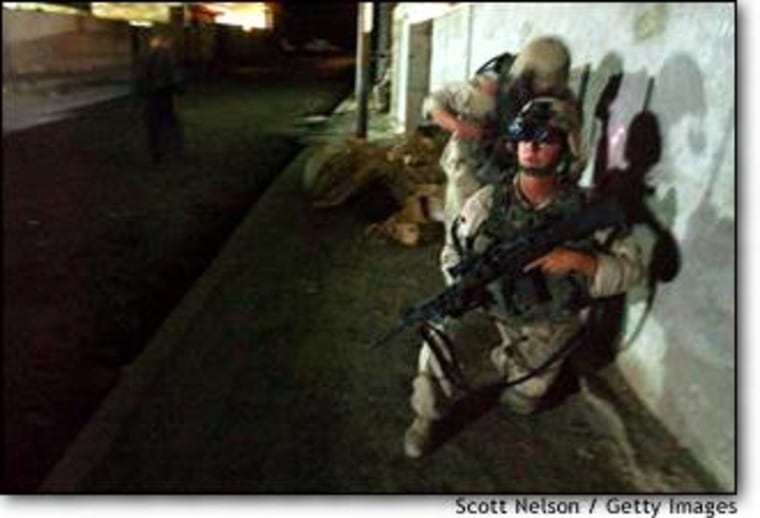The bombing of the United Nations headquarters in Baghdad this week has prompted the Bush administration to seek a new Security Council resolution that might lead to more countries sending troops to police Iraq alongside U.S. soldiers. Approval of such a resolution is far from certain, which leaves both President Bush and most of his Democratic presidential challengers united in a consensus view: Even if other nations aren’t willing to send forces to Iraq, no more U.S. troops should be sent.
But other politicians feel differently. Sen. John McCain, R-Ariz., and Sen. Kay Bailey Hutchison, R-Texas, who were in Baghdad when the blast occurred, have urged Bush to dispatch more American troops to Iraq.
“I am increasingly concerned we don’t have enough soldiers and Marines to do all the jobs that must be done,” Hutchison wrote Wednesday in an op-ed piece in the Washington Times.
Since early July, a leading Democrat on the Senate Armed Services Committee, Rhode Island Sen. Jack Reed, has been urging Bush to beef up American troops in Iraq and to expand the overall size of the U.S. military.
“We have to increase our forces in order to have an appropriate rotation schedule and in order to ensure that our troops have the time to train, prepare, rest, and regroup when they come out of these deployments,” Reed said in early July. “It’s not just Iraq, it is worldwide.”
BUSH STANDING PAT
For now, however, Bush and his aides are not enlarging the deployment in Iraq.
The head of the U.S. Central Command, Gen. John Abizaid, appearing alongside Defense Secretary Donald Rumsfeld at a Pentagon press briefing Thursday, said “there is a downside to having too many troops there. ... you increase your lines of communication, you increase your number of logistics troops, you increase the energy you have to expend just to guard yourself. I have never been one in favor of huge, ponderous forces.”
Rumsfeld said that despite the Baghdad bombing and the continued killings of American troops, “the American people have a very good center of gravity” and will continue to support the Bush administration’s policy.
But Democratic pollster Stan Greenberg, a partner in a group called Democracy Corps, found in his polling late last month that 52 percent of those interviewed think Bush lacks a plan for post-war Iraq and a plan to bring the troops home.
“Democrats should frame all the post-war problems through this central failing of the Bush administration,” said a Democracy Corps memo.
LOOKING FOR SHARP CONTRAST
Over the past several months, some of the Democratic presidential hopefuls — Florida Sen. Bob Graham, Ohio Rep. Dennis Kucinich and former Vermont Gov. Howard Dean — have spoken of the need to offer voters “the sharpest possible contrast” with Bush’s policies.
On Iraq, sharp contrasts with Bush could be either:
A call for withdrawal of U.S. troops, or ...
A call for more U.S. troops in Iraq and perhaps even a wider war against jihadists and terror groups.
For months, Kucinich has been the outspoken advocate of an “exit strategy” that would turn Iraq over to U.N. supervision and allow American troops to be pulled out.
“If anyone has been vindicated by recent events, it has been Dennis Kucinich,” said his campaign spokesman Jeff Cohen.
On the other hand, Graham, who voted against last October’s resolution giving Bush authority to use force against Iraq because he found it “too timid,” sought a broader resolution that would allow Bush to wage war against five terrorist groups in addition to al-Qaida, a war that might involve U.S. strikes on targets in Lebanon, Syria and Iran.
After Tuesday’s Baghdad blast, Graham issued a statement saying that “had the president pursued the War on Terrorism prior to initiating military action against Saddam Hussein — as I advocated last year — it is likely that al-Qaida and other terrorist networks would not have been able to take advantage of the chaos that now exists in Baghdad.”
But like Dean and other Democratic contenders, Graham is not willing to send more American soldiers to Iraq.
Democratic consultant Dr. Chris Kofinis says, “Democrats must begin to recapture national security issues and they can do so if they offer bold political action and policy ideas for addressing key threats to our national security.” Such ideas would include increasing the number of U.S. troops in Iraq and pressuring allies to contribute more troops.
In the event that Secretary of State Colin Powell’s bid for new Iraq peace-keeping contingents from other nations fails, most of the Democratic contenders will continue to face their current dilemma.
If they think the occupation must be successful, and if other nations don’t send troops, then do the Democratic contenders join with McCain, Reed and Hutchison in calling for more U.S. troops to be deployed?
HIGHER PENTAGON SPENDING
That step would imply that Pentagon outlays, which have already grown by 16 percent in the first 10 months of this fiscal year after growing by 14 percent last year, would become even bigger.
This would come amid Democratic criticism that the $4 billion-a-month Iraq effort is squeezing out spending on public schools and other domestic programs.
If, on the other hand, Democratic leaders think the occupation cannot or should not be successful, then it must be ended. So far only Kucinich has used the phrase “exit strategy.”
Some activist Democrats view the Iraq occupation as a misguided neo-imperialist venture. These voters would likely reject a candidate who called for sending more U.S. troops to Iraq.
Last week, Oklahoma Democratic activists booed Connecticut Sen. Joe Lieberman, who voted for the resolution authorizing Bush to attack Iraq, when he said some of his Democratic rivals “run the risk of sending a message that they don’t know a just war when they see one.”
“It’s a popular position among Democrats and among independents to call for an exit strategy,” said Cohen. “The Democratic base voters do not want a Democratic candidate who supports the status quo.”
